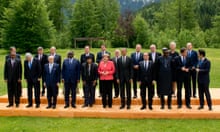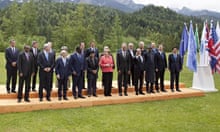Angela Merkel and her guests will pose for the group photo and say all the right things at their press conferences. The richest nations in the world, they will say, have never been closer, never more united in their commitment to solving the pressing problems of today. Yes, it’s that time of year again: the annual G7 summit.
The get-togethers started after the first oil shock in the 1970s but have long since ceased to matter. The G7 is a moribund institution and has been for the past decade. As an instrument of the internationalism it was set up to pursue, it is hopeless. It should be scrapped.
It takes a number of ingredients to make an international body work. There have to be problems that need solving. There has to be some degree of unanimity about how those problems should be solved. And there has to be leadership to ensure that unanimity when it is not immediately forthcoming.
Only the first of those ingredients currently exists. The G7 has plenty to talk about: Greece; Ukraine; the next set of development goals and how to finance them; climate change; trade; the weakness of the global recovery; how to engineer the exit from the zero interest rate environment of the past six years; combating systematic tax evasion; and tackling inequality. David Cameron wants the Fifa scandal to prompt a wider discussion about corruption.
What it does not have, and has not had since 2010, is a common view about how to go about achieving any of these aims. When the global financial crisis was raging, ideological differences did not matter. The G7 nations all cut interest rates and they all ran bigger budget deficits in an attempt to stimulate growth. But the consensus did not last, and divisions opened up. The Americans said growth should take priority over deficit reduction; the Germans, backed by the British, said that without a rapid return to fiscal rectitude there could be no sustainable growth.
Nor has a dominant figure emerged who is prepared to take charge, someone prepared to chivvy the reluctant into agreeing to be ambitious in those areas where there is a degree of consensus, such as the repeated promises to support development in the world’s poorest countries.
The one G7 leader who could do this is Barack Obama, and the expectation was that he would take up the mantle of leadership when Gordon Brown lost power in 2010. The US president has proved unwilling or unable to do so, with the result that the G7 leaders meet, issue a vapid communique, and hotfoot it back to the airport as fast they can.
For the past 14 years, the G7 has said it would spare no effort to complete the Doha round of trade liberalisation. It remains unfinished. The G7 is supposed to prevent beggar-thy-neighbour economic policies, yet its member countries are blatantly seeking to drive down their exchange rates to secure a competitive advantage.
There are specific instances where the G7 could – and should – be using its collective muscle but is failing to do so. The summit in Bavaria will be followed by three global summits in the second half of 2015: the first in Addis Ababa will look at financing for development; the second in New York in September will set the United Nation’s sustainable development goals (SDGs) for the next 15 years; the third in Paris in December will seek a legally binding deal on climate change agreed to by every nation.
The G7 should be working backwards from Paris. It should begin by asking itself what sort of cuts in carbon emissions would be needed to prevent a damaging rise in global temperatures. Countries big and small, rich and poor, will all need to play their part in meeting this target and failure in Paris will make it a lot harder to meet the UN’s sustainable development goals.
So the next question is how to help poorer countries make their growth sustainable, through help to make the transition to low-carbon energy infrastructure. That has financial implications, hence the importance of the summit in Addis Ababa next month.
A strong, confident G7 would be pledging money now, as it did at Gleneagles 10 years ago. That would increase the chances of the financing for development conference providing the money needed to achieve the SDGs and would vastly improve the chances of an ambitious outcome in Paris. Don’t hold your breath.
A second case for G7 action is Greece, where the risk of a default and possible exit from the eurozone has increased over the past week. Relations between Athens and its creditors have soured. Greece thinks the troika of the European commission, the European Central Bank and the International Monetary Fund are making unfair demands that will damage the economy and are impossible politically. The troika thinks the Greeks are not serious about reforming their economy and that providing any more financial assistance will be throwing good money after bad.
The G7 has been here before. In the 1990s, sub-Saharan African countries that had been poorly run found themselves burdened with debts that they had no hope of paying. Germany led the resistance to providing debt relief on the grounds that rewarding bad behaviour would simply lead to more of the same. Only after a protracted struggle was the opposition overcome.
Negotiations between Greece and the troika have centred on short-term issues, such as how big a budget surplus the country should run once taking account of the interest payments on its debts. But as Jonathan Loynes of Capital Economics has pointed out, the real issue is that Greece’s debts are – like those of Tanzania or Zambia two decades ago – unpayable. Short of a miracle, Greece is going to need a big writedown. Greece currently has a debt to GDP ratio of 175%, but its creditors are assuming that it will grow by almost 3.5% a year on average in each of the next five years and that this will bring the debt ratio down to 120% of GDP, at which point the country might again be able to raise money in the financial markets.
This is fantasy stuff. Greece is unlikely to grow at anything like these rates, especially if saddled with a fresh dose of austerity. The IMF knows this, which is why it has been pressing, so far unsuccessfully, for a debt write-off to be part of any new financial deal for Greece. Obama knows it, which is why the US Treasury has been putting pressure on Europe to strike a compromise agreement with Athens. A coalition that included Obama, François Hollande and Cameron could put real pressure on Merkel. But it won’t happen. Obama is not engaged enough. Hollande is too weak. Cameron needs Merkel to help him with his EU renegotiation. The G7 will wring its hands but do nothing. It has outlived its purpose.








Comments (…)
Sign in or create your Guardian account to join the discussion